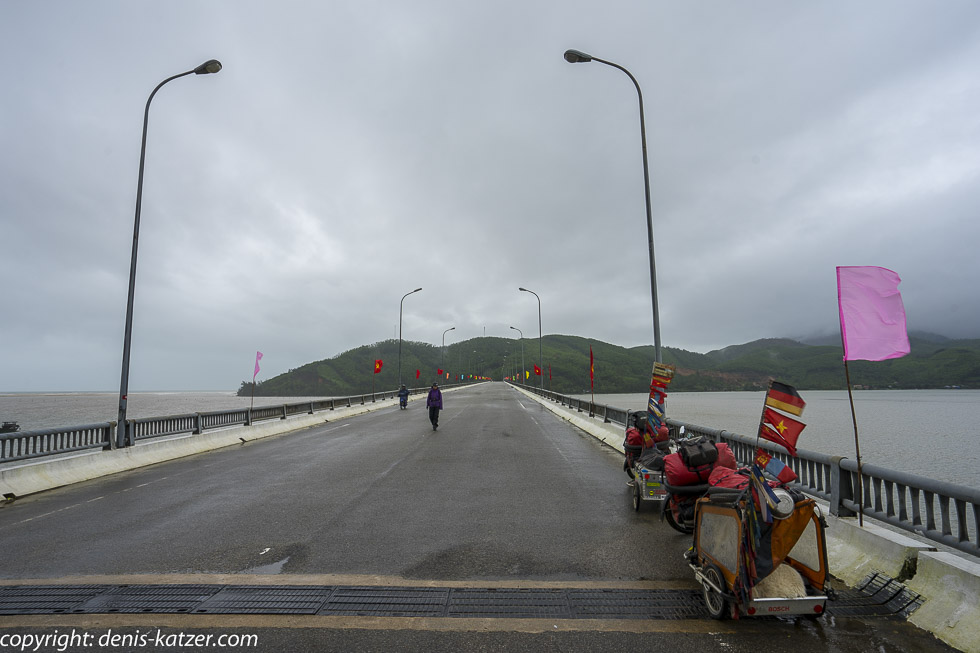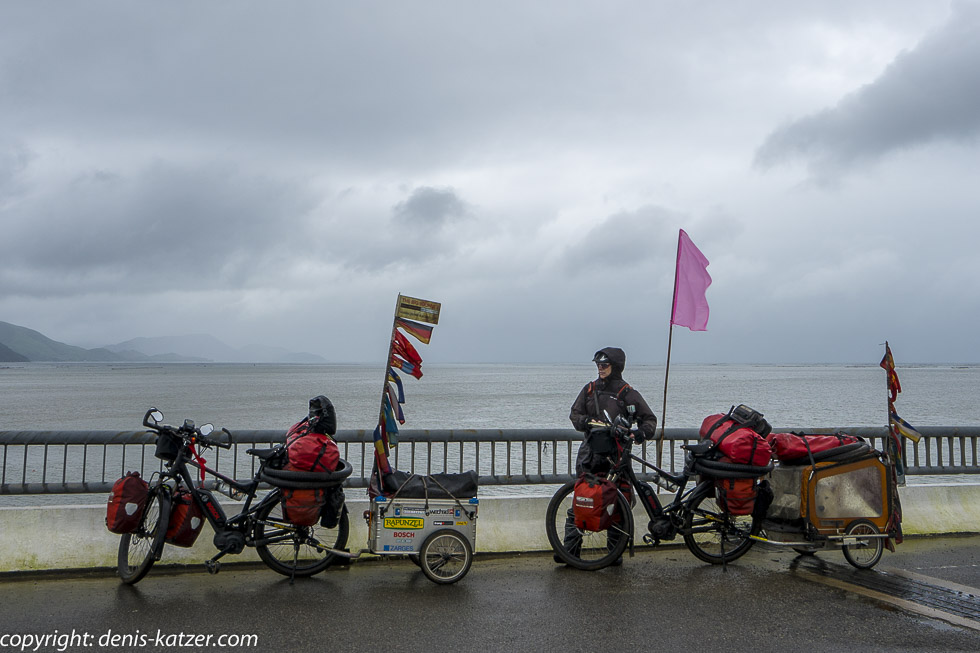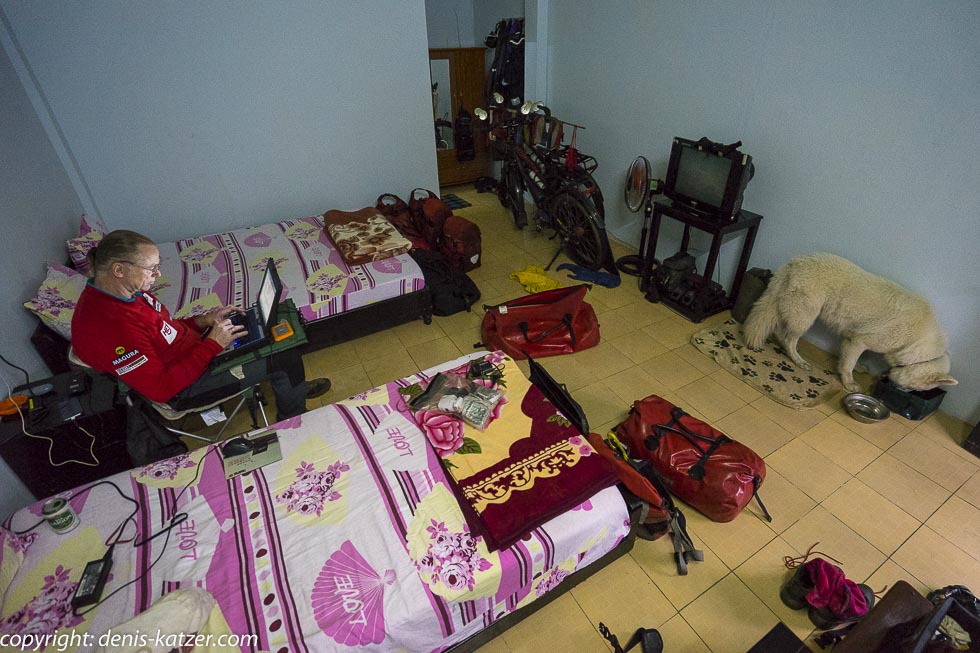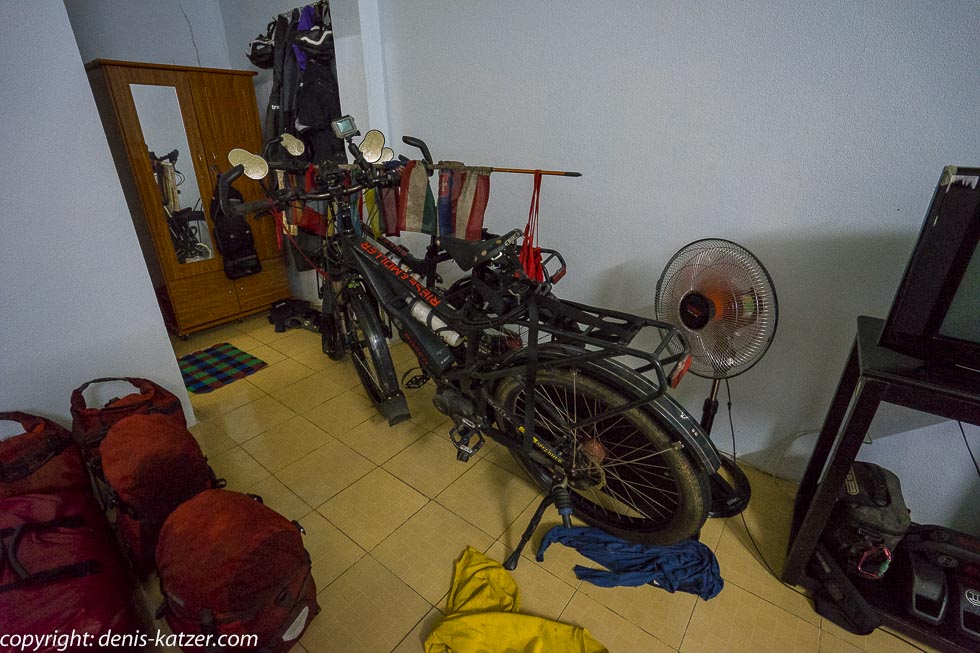
Depressing wetness
N 16°33'15.7'' E 107°39'25.0''
Date:
24.01.2017
Day: 574
Country:
Vietnam
Province:
Quảng Trị
Location:
Beach there
Latitude N:
16°33’15.7”
Longitude E:
107°39’25.0”
Daily kilometers:
22 km
Total kilometers:
21,511 km
As the crow flies:
12 km
Average speed:
18.4 km/h
Maximum speed:
32.1 km/h
Travel time:
1.10 hrs.
Soil condition:
Asphalt / gravel
Maximum height:
10 m
Total altitude meters:
58.499 m
Sunrise:
06:21 am
Sunset:
5:40 pm
Temperature day max:
18°C
Departure:
1:00 p.m.
Arrival time:
3:00 p.m.
(Photos of the diary entry can be found at the end of the text).
LINK TO THE ITINERARY
Heavy monsoon rains pelt down on the land. Nothing new for us, but no less unpleasant for that. We steer our bikes with concentration through the splashing and loudly rattling anthill of mopeds. When Tanja suddenly disappears in my rear-view mirror, I stop to see where she is. A couple of moped riders got between us, which is why she didn’t make it through the green phase of a traffic light. It’s not easy to drive one behind the other in the hustle and bustle of a city, because inconsiderate road users often get in the way, slow you down, push you off or cut you off. We’ve gotten used to this over the last 10,000 kilometers, but I still get a little nervous every time we lose sight of each other for a moment.
We reach the small coastal road that winds its way through many villages. “There’s a narrow path up ahead that leads to the beach. If we follow it, we’ll get to the Hue beach bar,” I say. “I’m looking forward to it,” says Tanja, as we had actually wanted to spend and enjoy the turn of the year in the Beach Bar, which was highly praised on the Internet portal. Well, things turned out differently, and we didn’t reach our dream home until more than three weeks later. An inconspicuous path takes us to the resort reception, which looks rather sad than inviting because of the rain. The receptionists are friendly and show us the parking lot where we should leave our bikes. “Don’t they have a locked room? Our bikes are very valuable and we can’t leave them outside,” I ask. “Do you see the classic cars in the parking lot?” “So what?” “My boss collects the expensive cars and no one has ever tried to steal them.” “Bicycles are easy to steal. A classic car like that would have to be lifted onto a tow truck and driven out of the facility. That would certainly attract attention at your reception,” I reply in a friendly manner. “Unfortunately, we don’t have a room for your bikes.” “Hm, can I have a look at one of the rooms?” “I’d love to,” the girl replies, so I follow her. After 50 meters we leave the main path and walk over narrow stone slabs laid on sand. “Um, how are we supposed to roll our bikes with the trailers over these stone slabs to the room?” I ask, because they would sink into the fine sand between the slabs. “I told you to leave your bikes in the parking lot and carry whatever luggage you need into the hut.” After another 300 meters we reach small stone huts dripping in the rain. Trudging through the wet sand, we pass the first hut. What a feat to carry all our bags here. The girl opens the padlock and pulls the door open. My gaze falls into a small room with three beds. At first I look at the wine cellar, speechless. “And where should we put our bags?” I want to know, because there are no storage options in the three to four square meter room without any facilities. “I don’t know.” “And our dog? It won’t fit in here.” “The room is actually too small for all your bags and your dog. Travelers who usually only have one rucksack with them stay here.” “Hm, don’t they have larger rooms?” “We do, but they cost more than US$36.”
Back at Tanja’s, I tell her about the simple, dwarf-like dormitory where we have no chance of storing our equipment and staying inside at the same time. “When I booked here in advance, I didn’t realize that it was just a bedroom.” “At US$36 a night, you couldn’t have known that either,” I reply. “And what do we do now?” asks Tanja, standing next to her bike, dripping wet from the rain. “Well, we can’t stay here,” I reply and ask the girl if there is any other accommodation nearby. Although we cancel our booking, she remains extremely friendly and shows us the way to another hostel about three kilometers away on a small map. “I don’t know if they’ll accept your dog, but you can give it a try.” We say goodbye to the rainy beach resort and continue on our way.
“There it is!” shouts Tanja 15 minutes later. We let our bikes roll onto the deserted-looking forecourt. “I think they’re closed,” I say dejectedly, and because the water is already flowing out of my shoes, I freeze a little. “Someone is sleeping there,” says Tanja, pointing to a person she spots under a canopy. “Hello! Haaallo!”, I shout, whereupon the person stands up, looks at us a little confused at first and then jumps up from his lounger. “Ha, ha, ha,” the man approaches us, laughing. When he discovers Ajachi in his trailer, he laughs loudly and heartily again. “He’s drunk,” says Tanja. “Looks like it. He’s probably been partying hard because of the Tet Festival,” I reply and try to ask him with our poor language skills if there’s a room for us. At that moment, his wife shuffles out of one of the rooms. She looks at us shyly. It looks like tourists rarely come by here to ask for overnight accommodation. The woman, followed by her still smiling husband, shows me an amazingly large room for 200,000 dong (€8.20) in which even our bikes can easily fit. “We’ll stay,” I decide, relieved not to have to cycle any further through the wet. We clean the dirty panniers and bikes with a porous water hose and carry everything, including our bikes, to the simple room. “Finally in the nest,” I snort with relief, taking off my soaked clothes and pulling something dry out of the saddlebags…
If you would like to find out more about our adventures, you can find our books under this link.
The live coverage is supported by the companies Gesat GmbH: www.gesat.com and roda computer GmbH http://roda-computer.com/ The satellite telephone Explorer 300 from Gesat and the rugged notebook Pegasus RP9 from Roda are the pillars of the transmission. Pegasus RP9 from Roda are the pillars of the transmission.





